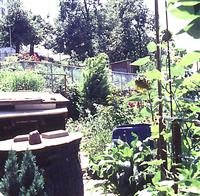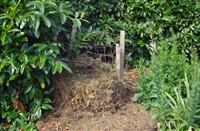 Compost is indeed the powerhouse in any growing system, but is particularly valuable in organic growing where chemical fertilisers are not used. Its benefits cannot be underestimated:
Compost is indeed the powerhouse in any growing system, but is particularly valuable in organic growing where chemical fertilisers are not used. Its benefits cannot be underestimated:
- It improves soil structure in all types of soil.
- It provides slow release nutrients for plants to use when required.
- It increases the level of soil micro-organisms exponentially.
- Composted soils produce plants more resistant to pest and disease attack
- Compost making is an environmentally sustainable method of recycling ‘waste’ material.
- Home-made compost is effectively cost-free.
What can be composted?
Any organic material, if left long enough, will eventually rot down due to the action of micro organisms. Composting harnesses and maximises this process; speeding up the rate of decomposition, and minimizing nutrient losses.
Less Suitable For Composting:
- Meat or fish - can attract vermin, and become putrid.
- Roots of perennial weeds (unless hot composting).
- Seed heads of annual weeds.
- Too much of any one material in one layer. Grass clippings should be added in layers not more than 4 – 6 cm and preferably mixed with some dry material.
- Layers of evergreen prunings - these need to be finely shredded.
- Diseased plant material – particularly soil-borne diseases such as club-root (brassicas), white rot (onions), potato cyst eelworm.
- Material that has been sprayed with herbicides.
- Thorny or spiky plant material; thorns don’t decompose easily and can cause injury once the compost is spread.
So What Do You Need to Make Great Compost?

1. Plenty of organic matter in the right ratio (as above).
2. Sufficient nutrients, particularly nitrogen the bacteria th
at break down material in the compost need nitrogen to survive; they will die in low nitrogen levels. Nitrogen can be kept up by the addition of manure.
3. Sufficient and well dispersed oxygen to speed up the rate of decomposition. Oxygen can be added to a compost heap by using ventilated pipes running through the heap or by turning the compost regularly. Water can often build up at the base of a compost heap to a degree where it slows the composting process. Lay agricultural underneath the heap to help remove excess water.
4. Sufficient and well dispersed water water content of above 50% will give good rates of decomposition, but too much water (max. 80%) make the compost water logged and stale. If the compost is too dry, add water to the compost when it is turned. The compost should have the moisture content of a squeezed sponge, damp but not soggy.
5. A source of nutrients - especially calcium, to stabilize the compost. Calcium acts as a buffer to stop pH levels from varying too much. Gypsum is sometimes added to compost heaps as a source of calcium at the rate of 1 3kg per cubic metre of compost, this also has the effect of reducing odours and reducing nitrogen losses.
6. Appropriate temperature for the compost heap to decompose effectively, the heap needs to reach a heat of between 40 and 60°C. This heat is generated by the 'body' heat given off by the microbes in the heap. If the heap becomes too hot then some of these microbes can be killed; cool the heap by blowing air through ventilation pipes in the heap or by turning it regularly.
7. Appropriate pH as plant sap is acidic, compost heaps will start off acidic and may become more acidic in the early stages of decomposition, this will stabilise to earlier levels later. Lime or dolomite can be added to offset the initial drop in pH however this may result in the loss of nitrogen from the heap, thereby slowing down the decomposition process.
Learn more -Read our ebook "Organic Gardening" by John Mason; available on this web site.